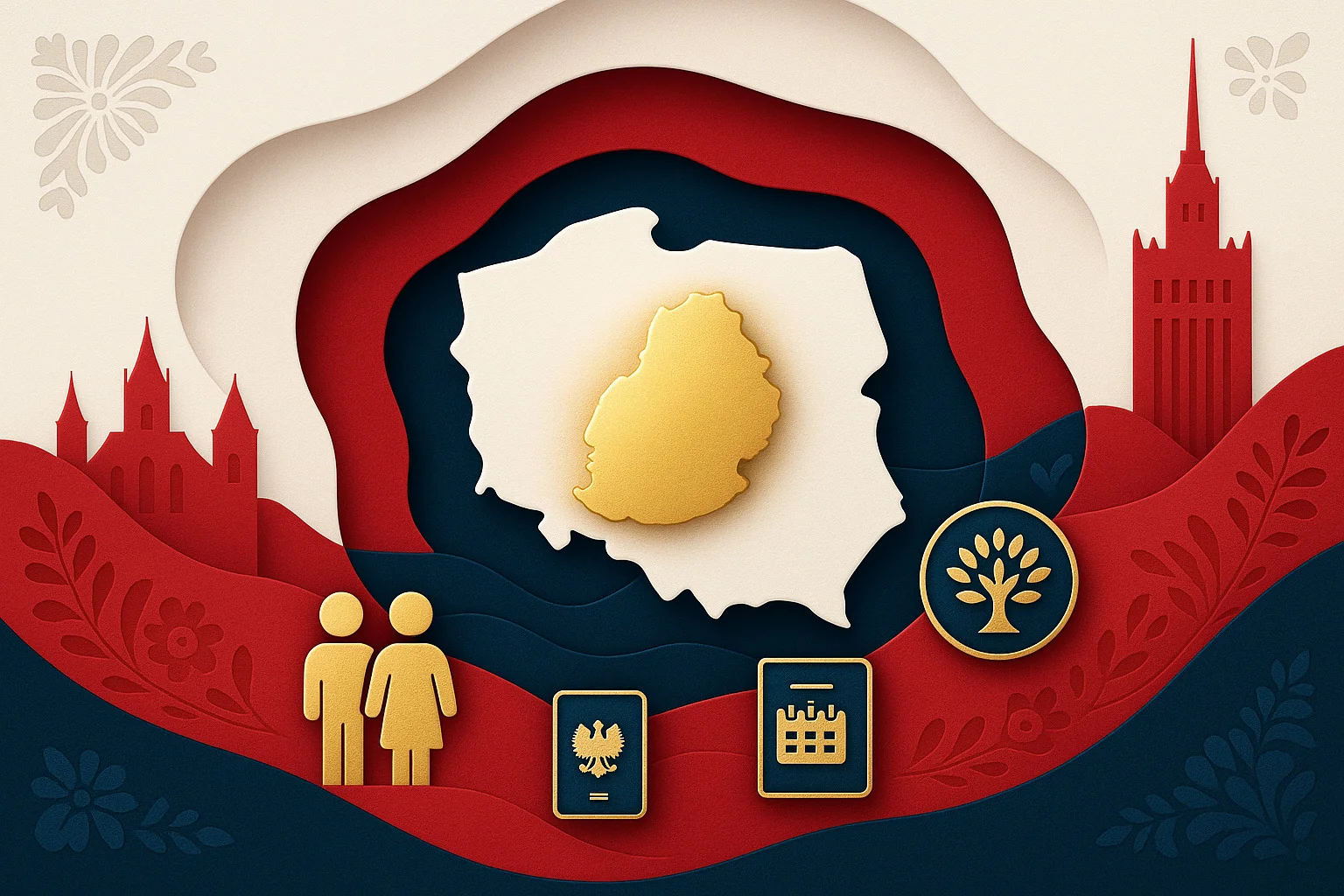How to qualify for Polish citizenship in 2025 — naturalisation, marriage & descent
120
9/24/2025

How to qualify for Polish citizenship in 2025 — naturalisation, marriage & descent
Polish citizenship in 2025 grants full rights in the European Union, including free movement across the Schengen Area and access to Polish social benefits. Unlike residence, citizenship provides a Polish passport and political participation. The process is regulated by the Polish Citizenship Act (2009) and decisions are made by the President of Poland or regional Voivode offices. This guide explains naturalisation, marriage, descent, and the latest changes for 2025.
Key terms to know
- President of Poland — ultimate authority granting citizenship by presidential decision.
- Voivode (Wojewoda) — regional office processing certain citizenship and residence applications.
- Karta stałego pobytu — permanent residence card, often required before naturalisation.
- Jus sanguinis — principle of citizenship by descent.
- Polish language certificate (B1) — required for naturalisation applicants.
Routes to Polish citizenship
Foreign nationals may qualify for Polish citizenship in 2025 through the following main routes:
| Route | Eligibility | Timeline | Key conditions |
|---|---|---|---|
| Ordinary naturalisation | 3 years with permanent residence + marriage, or 10 years with residence | 12–24 months | B1 Polish exam, financial stability, good conduct |
| Marriage-based naturalisation | 3 years married to Polish citizen + 2 years residence | 12–18 months | Proof of genuine marriage and cohabitation |
| Citizenship by descent | Children or grandchildren of Polish citizens | Immediate once proven | Birth certificates, family documents proving Polish roots |
| Presidential grant | Exceptional contribution to Poland | Variable | No residence requirement, discretionary decision |
Step-by-step naturalisation process in 2025
- Hold permanent residence (karta stałego pobytu) for at least 3–10 years depending on case.
- Pass the certified B1 Polish language exam.
- Prepare documents including police clearances and proof of financial stability.
- Submit application at the local Voivode office or directly to the President.
- Undergo interviews and document verification.
- Receive decision and collect Polish citizenship certificate.
Step-by-step marriage route
- Be married to a Polish citizen for at least 3 years.
- Hold 2 years of uninterrupted residence in Poland.
- Provide marriage certificate and joint residence proof.
- Submit application with language certificate and financial documents.
- Wait for verification and approval.
- Receive naturalisation certificate and apply for Polish passport.
Citizenship by descent
Poland follows jus sanguinis, meaning citizenship is inherited by blood. Children of Polish citizens automatically qualify. Descendants up to second generation may claim citizenship if family records confirm Polish nationality. In 2025, digital access to historical archives has made verification faster for applicants abroad.
Documents checklist
- Valid passport and Polish residence card
- Birth certificate (translated into Polish)
- Marriage certificate (if applying through spouse)
- Polish language exam certificate (B1 level)
- Police clearance from Poland and country of origin
- Proof of stable income and housing
- Application forms submitted to Voivode or President’s office
Costs and timelines
Application fees range from PLN 200 to PLN 400. Processing takes 12–24 months, though descent-based applications may be recognised in less than 6 months. Marriage-based cases average 12–18 months. Presidential grants vary greatly depending on individual circumstances.
Integration and language requirements
Applicants must demonstrate integration into Polish society. A B1-level Polish certificate is mandatory for most naturalisation cases. Integration is assessed by employment, family ties, tax compliance, and residence records.
What changed in 2025
- Mandatory online pre-registration for citizenship applications through Voivode offices.
- Faster processing of descent applications with digital archives.
- Stricter checks on marriage-based applications to confirm genuine relationships.
- Expanded recognition of dual citizenship with certain EU and non-EU countries.
Common mistakes to avoid
- Submitting incomplete translations not certified in Polish.
- Applying before meeting residence or marriage duration requirements.
- Failing the B1 Polish exam due to poor preparation.
- Not proving continuous residence with official records.
FAQ about Polish citizenship
- How many years do I need for Polish citizenship? Usually 10 years of residence, reduced to 3 with marriage to a Polish citizen.
- Is dual citizenship allowed in Poland? Yes, Poland recognises dual nationality in many cases.
- Do I need to speak Polish? Yes, B1-level proficiency is mandatory for naturalisation.
- Can I apply if I have Polish roots? Yes, citizenship by descent is available if documents confirm ancestry.
- Who decides on citizenship applications? The President of Poland makes the final decision, often based on Voivode recommendations.
Expert opinion
“Polish citizenship in 2025 continues to require clear proof of integration and language ability. Descent-based routes remain the fastest, while naturalisation demands patience and preparation.” — VelesClub Int. Immigration Team
Next steps
Explore our platform and check the Residency & Citizenship hub for detailed guides. Visit our main page or go directly to the Residency & Citizenship hub.
Are there any questions or do you need advice?
Leave a request
Our expert will contact you to discuss tasks, choose solutions and be in touch at each stage of the transaction.
